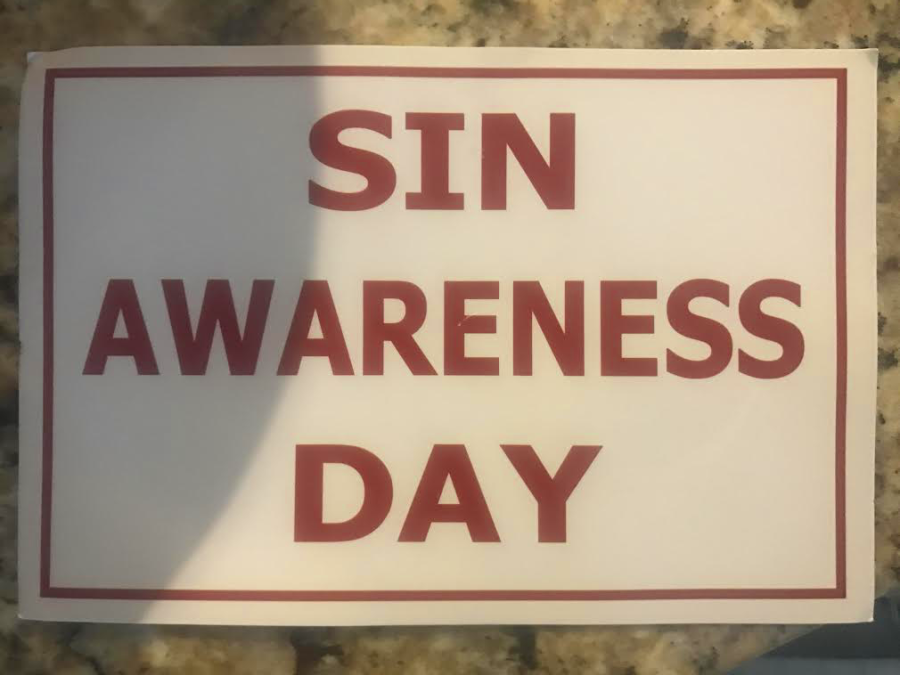Clutching signs reading “Evolution is a Lie,” seven born-again Christians visited the University of Massachusetts Boston claiming students and faculty were sinners. While many were confused or upset by their presence, others believe it is important that they remain here as a central part of the UMass Boston experience.
This past Wednesday, Scott Smith, founding missionary of School Master Ministries, was accompanied by six other preachers as a part of their Ivy League tour. According to multiple students and faculty, this is not the first time they have been here. “This is something that I’ve seen happening here pretty much once a semester, every semester that I’ve been here,” said Itai Halevi, a senior lecturer in the English department.
According to Smith, UMass Boston is just one of the stops these preachers plan to make as a part of their Ivy League tour. “We’ve been at Brown already this week and we did Yale on Friday. Tomorrow, we’ll be at [the University of Rhode Island], so it’s more Ivy League than others, but we throw in a couple other campuses.” Smith clarifies that they are not part of an organized group, but rather are friends identified by Smith as “born-again Christians.”
Felicia Femino, a student at UMass Boston, was uneasy: the event was “a little chaotic… There was this back and forth between students shouting at them, and them shouting back at the students, so I’m not really sure if anyone got their point across.”
Before starting college, Femino attended a private Catholic school on the South Shore. However, what she heard from Smith “is very contradictory to everything that I learned in my Catholic school… [We had] students that didn’t identify as straight and there was never an issue.”
Like Femino, Nicholas Roberts, a current member of the Queer Student Center, feels that their messages are troubling. “I don’t like it at all because I feel like not only is it offensive but it’s just mean spirited.”
Roberts claims that they are strategically discriminating against specific minorities on campus. “They’re definitely targeting our LGTBQ+ community. There’s no question about that. I think that’s one of the reasons they’re here, because we’re such a diverse campus, and they know that there are a lot of easy targets here.”
Roberts continues with other groups that may be affected. “Women on campus are a major target for them because another one of their big things is abortion and they really like to focus on that for some grotesque reason.”
To help those that did not feel supported during the event, the Office of Diversity and Inclusion set up a table near Smith and his fellow preachers to ensure that students were aware of the resources available to them. They handed out rainbow stickers and flyers titled “3 Ways to Help.” The flyer asks student not to “engage the speaker” and specifies that “UMass Boston is an inclusive campus” with supports ranging from “student groups on campus like the Queer Student Center” to free counseling.
Georgianna Meléndez, the interim director of the Commonwealth Compact at the Office of Diversity and Inclusion at UMass Boston, explains that the preachers are part of the community and are entitled to speak on campus: “We are a public university and these are members of the community who want to share a belief system with our students. Given the First Amendment rights, they have the right to be here and we have students who support their belief system and we also have student who are very upset, who are traumatized and triggered by the messages that are being shared.”
Although many students were offended by what Smith and his peers were saying, some members of the UMass Boston community felt that it is important that they speak here. Student Adam Finkle saw this as an opportunity to expose the intolerance currently existing in the U.S.: “If you want to see the skin ripped off American society, to see whatever bigotry there is underneath, this is a sort of highlighted and exaggerated version of that. It’s beaten, but it’s not dead and it’s not gone.”
Halevi shared a similar standpoint: “I think it’s actually a good thing because it becomes a venue where we have to try to engage with people in dialogue, people who may not agree with us. I feel that [UMass Boston] is a place where we have to experiment with discourse. How do we talk through these difficult things without resorting to violence?”
School Master Ministries Protest At UMass Boston
September 28, 2017





















































